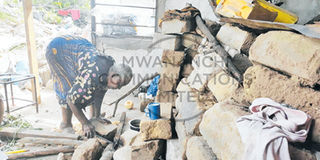Family turns destitute overnight

Buguruni kwa Madenge resident in Dar es Salaam Amina Kwasa lights a fire inside a makeshift home where her house used to stand before it was demolished by Rahco to pave the way for the construction of the new standard gauge railway. PHOTO | SAUMU MWALIMU
What you need to know:
- Close to a makeshift house, one of several in the area, stands and elderly woman who identifies herself as Amina Athuman Kwasa. Until last week, she owned one of the houses in this unplanned settlement close to the heart of the city of Dar es Salaam.
- But, fortunes changed when during the weekend, Reli Assets Holding Company (Rahco), decided to pull down houses constructed within the railway reserve area.
Dar es Salaam. Piles of rubble stretch a section of Buguruni Madenge, where tens of young people move from pile to pile scavenging items like old tins, iron bars and plastic materials that can be resold later.
Close to a makeshift house, one of several in the area, stands and elderly woman who identifies herself as Amina Athuman Kwasa. Until last week, she owned one of the houses in this unplanned settlement close to the heart of the city of Dar es Salaam.
But, fortunes changed when during the weekend, Reli Assets Holding Company (Rahco), decided to pull down houses constructed within the railway reserve area.
The demolition was carried out to pave the way for the construction of the $1.2 billion standard gauge railway linking Dar es Salam to Morogoro scheduled to begin this month. The exercise razed to the ground houses built within the 30-metre reserve.
“I’ve nothing to feed my grandchildren. I’ve no place we can use as shelter,” laments Ms Kwasa, whose age could not be established immediately. She has been living at the area with eleven of her grandchildren.
“Buguruni Madenge is the only home I’ve known my entire life. My late husband left me the house, now it too has gone just like that. This is maximum punishment I can endure,” says the visibly shocked woman. She says, it was more than a house to her. She had rented out some of the rooms in order to earn some money that helped her support her grandchildren.
Four of the grandchildren are at different levels of education, with her their sole provider. Some are orphans while others have been abandoned by their parents.
“And, now, some of my former tenants want me to refund them the rent they paid just a few months ago, where will I get the money?” she inquires in a state of helplessness.
Standing at what was once her room, but now an open space, she says: “As you can see, this has become my kitchen, living and bedroom. I have collected a few blocks to put up a makeshift house. But, even with the ongoing rains, we sleep out in the open. Only a few of my grandchildren have secured a place at the neighbours’ house.”




